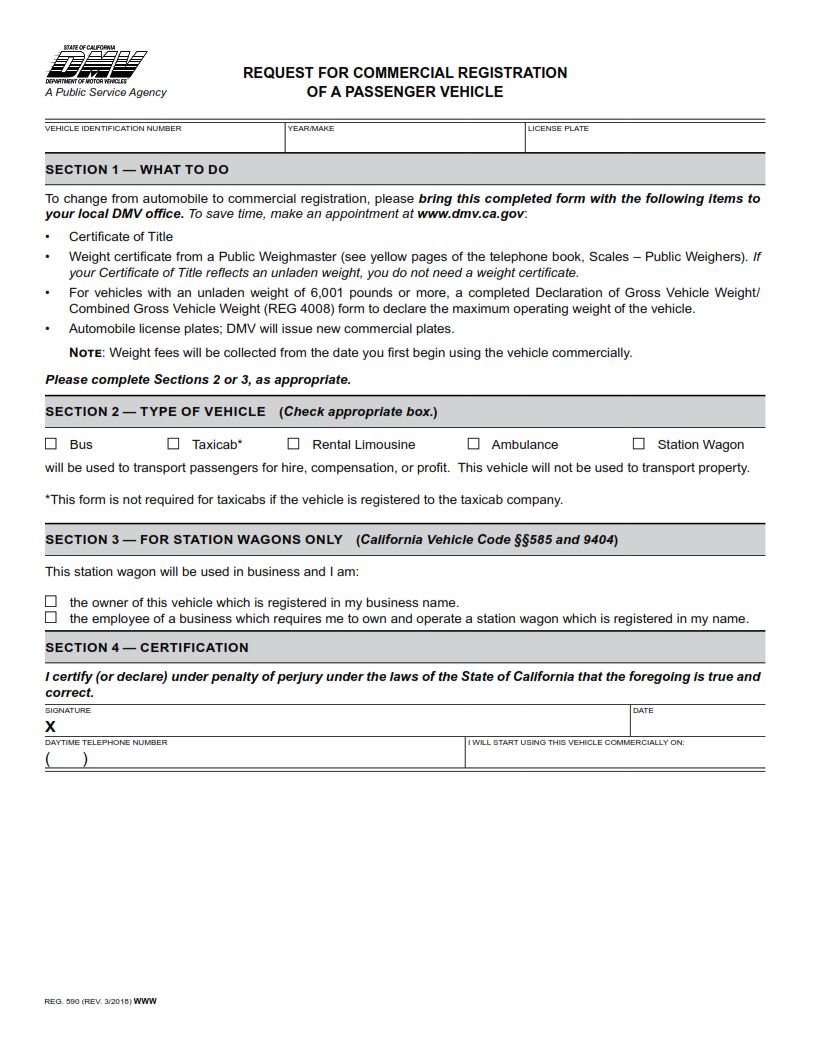FINDERDOC.COM – REG 590 – Request for Commercial Registration of a Passenger Vehicle – This article aims to provide guidance for individuals or businesses who are looking to register a commercial passenger vehicle under the REG 590 regulation. Specifically, this article will outline the requirements for registration, how to complete an application, and any additional information necessary for successful completion of the request. It is important to note that certain restrictions and regulations apply when applying for a REG 590 form. Therefore, it is essential that applicants understand the complexities of registering a commercial passenger vehicle in order to avoid potential problems or delays with their request.
Download REG 590 – Request for Commercial Registration of a Passenger Vehicle
| Form Number | REG 590 |
| Form Title | Request for Commercial Registration of a Passenger Vehicle |
| File Size | 229 KB |
| Form By | California DMV Form |
What is a REG 590 Form?
REG 590 is a form that must be completed and submitted to the California Department of Motor Vehicles (DMV) by anyone who wants to register their commercial vehicle. The form provides detailed information about the vehicle, including its make, model, year of manufacture, engine number, and license plate number. It also asks for specific details about the proposed use of the vehicle and its intended purpose.
The REG 590 form must be accompanied by other documents such as proof of ownership, payment for registration fees and taxes, and proof of insurance coverage. Once all required documents are collected and submitted to the DMV along with the completed REG 590 form, an application will be processed for commercial registration. If approved, a personalized license plate will be issued to the registrant along with other relevant documentation such as title certificates.
What is the Purpose of the REG 590 Form?
REG 590 is the form used to register a passenger vehicle in order to obtain a California Certificate of Title. The purpose of REG 590 is to provide the necessary information for the Department of Motor Vehicles (DMV) to verify ownership and record lien information, if applicable.
In addition, REG 590 also serves as proof of payment for sales tax on the vehicle. It requires detailed information such as make and model, year, Vehicle Identification Number (VIN), odometer reading, date purchased or acquired and name of the seller. If a lien exists against the vehicle, additional information regarding the lender will also be required. Once completed and submitted with all required documents and fees paid, DMV will issue an original title that must be kept with the vehicle at all times.
Where Can I Find a REG 590 Form?
REG 590 is an important form used to register a commercial passenger vehicle in California. The form must be completed and submitted to the DMV, along with any applicable fees, in order to receive registration for your vehicle.
The good news is that the REG 590 form is readily available online, which makes it easy and convenient to access. The DMV’s website hosts digital versions of the form that can be filled out directly on their website or downloaded as a PDF document. Additionally, many third-party websites offer free downloads of the REG 590 form so you can print it out from your own printer and complete it at home. Once you have filled out the entire form and included all necessary documentation, you may submit it by mail or in person at your local DMV office.
REG 590 – Request for Commercial Registration of a Passenger Vehicle
REG 590 is a form used by the California Department of Motor Vehicles (DMV) to register a passenger vehicle for non-personal use. This type of registration is required for vehicles used in transportation services, such as ride-sharing and delivery services, that are operated on public roads or highways. To be eligible for this type of registration, an applicant must submit proof that their vehicle has been approved by a local government agency or an inspection station certified by the DMV.
The REG 590 form includes sections to provide information about the owner and vehicle, as well as sections related to fees and taxes. The applicant must also demonstrate financial responsibility through insurance coverage and provide proof of payment of any applicable sales tax. Once all documents have been submitted, the DMV will review them before issuing a commercial registration card which allows the vehicle to be legally operated for commercial purposes in California.
REG 590 Form Example
